From ESS News
The Philippine Department of Energy (DOE) said on Tuesday that its GEA-3 auction round, focusing on technologies not eligible for feed-in tariff (FIT) such as pumped hydro storage, impounding hydropower, and geothermal, demonstrated an overwhelming response from industry stakeholders.
A total of 14 projects, with delivery period from 2025 to 2035, were submitted in the auction with a cumulative capacity of 7.5 GW, exceeding the installation target of 4,650 MW.
Offers for pumped hydro storage projects reached 6,950 MW, surpassing the 4,250 MW target installation.
Lot 1 procured 2 GW of pumped hydro storage, which should be delivered on the country’s largest and most populous island, Luzon, in the period between 2028-2030. The offered capacity stood at 2.5 GW.
Lot 2 was seeking to add 2 GW also in Luzon in 2031-2032 and was heavily oversubscribed with 4.2 GW of offered projects. The target of 250 MW was successfully procured in Lot 3 and shall be delivered in the Visayas region in 2031-2035.
To continue reading, please visit our ESS News website.
This content is protected by copyright and may not be reused. If you want to cooperate with us and would like to reuse some of our content, please contact: editors@pv-magazine.com.









By submitting this form you agree to pv magazine using your data for the purposes of publishing your comment.
Your personal data will only be disclosed or otherwise transmitted to third parties for the purposes of spam filtering or if this is necessary for technical maintenance of the website. Any other transfer to third parties will not take place unless this is justified on the basis of applicable data protection regulations or if pv magazine is legally obliged to do so.
You may revoke this consent at any time with effect for the future, in which case your personal data will be deleted immediately. Otherwise, your data will be deleted if pv magazine has processed your request or the purpose of data storage is fulfilled.
Further information on data privacy can be found in our Data Protection Policy.